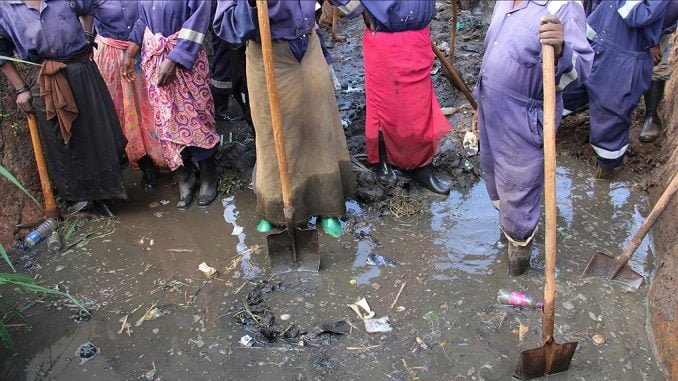
Kampala, Uganda | URN | Every weekday, hundreds of casual labourers employed by Kampala Capital City Authority (KCCA) sweep streets and various roads in the city to keep them clean.
Working in groups of five, the labourers are required to sweep and collect garbage at a specific point for collection by garbage trucks that take it for final disposal at the Kiteezi landfill.
However, some of the labourers act to the contrary. This publication has repeatedly observed several labourers pushing garbage and lumps of soil in the drainage channels, which worsens flooding whenever it rains in the city.
This practice is common along Mambule road in Bwaise, Kawempe Division, Kasule road in Wandegeya, Bwaise-Nabweru road and Kawempe Ttula road among others. A female labourer in her 50s who declined to disclose her name said the garbage collection points are placed far apart yet most of them cannot carry the tons of dust gathered. Majority of the labourers are old women.
“There is a lot of dust and silt on the road. You cannot lift it to the collection points, which are close to half a kilometer away. What we do is to remove the garbage. For the dust, you either sweep it directly into the channel or collect it at several points and pour it into the drain somewhere close,” she said.
According to the KCCA guidelines, such workers are supposed to have a wheelbarrow to carry the garbage but many improvise with bags. Another labourer, who only introduced herself as Namatovu, said that KCCA has not provided them with enough equipment to facilitate their work.
She says they have to share a wheelbarrow among more than ten people, which becomes hard for them yet they need to finish their work as early as possible to let city dwellers carry on their duties efficiently.
“We don’t have enough wheelbarrows to transport the garbage to a collection center. And you know when you’re sweeping, you want to hurry so that the sun doesn’t find you still on the road,” said Namatovu.
Waswa Bukenya, who lives near a trench in Nabweru, says that KCCA needs to equip its workers well and sensitive them on the danger of dumping in drainage channels. He says when channels are silted; it exposes the people neighbouring the drains to flooding during the heavy downpour.
Jude Byansi, the manager sanitation at KCCA, says that their supervisors have made similar observations and received reports pertaining casual workers dumping waste in drainage channels. Byansi acknowledges the fact that the Authority lacks sufficient equipment to use in cleaning and collecting garbage in the City.
He says ideally each group of five people should have a wheelbarrow but they are currently experiencing a gap where more than five groups comprising 25 people share a wheelbarrow.
Read Also: Open trenches in Kampala are death-traps
“The casual workers are not well facilitated yet we want them to deliver clean roads. Some of the wheelbarrows are too old, apart from being insufficient. So, they are constrained but they should not be dumped in the drains either. We also don’t have enough garbage collection trucks,” said Byansi.
There are only 21 operational garbage trucks, which collect garbage from different parts of the city. There are also private companies offering the services at a fee. However, for road cleaning, KCCA trucks collect the garbage. Eng Brian Baagala, the KCCA manager for drainage, says that the frequent disposal of solid waste in open drainage channels is a key contributor to localized flooding in Kampala due to blockage of inlets, drainage channels & culvert crossings.
He however says that residents dump much of the waste in channels. He says most of the sand is concentrated in drains in the central business district where a lot of flooding is experienced during rainy seasons. KCCA desilts drainage channels every three weeks or depending on need and spends over Shs 800 million on casual workers.



